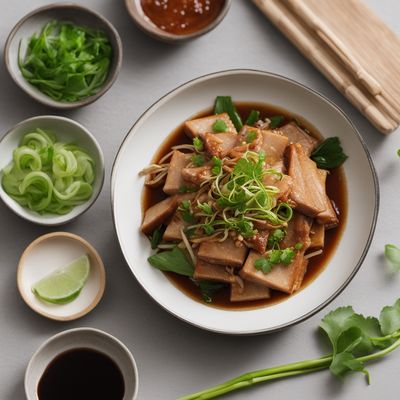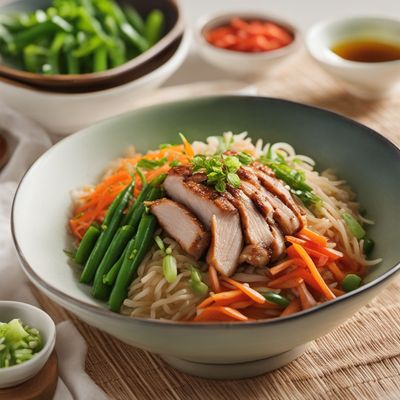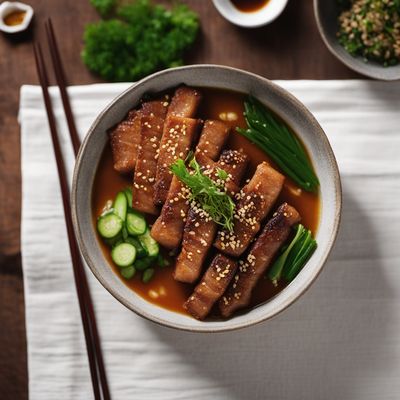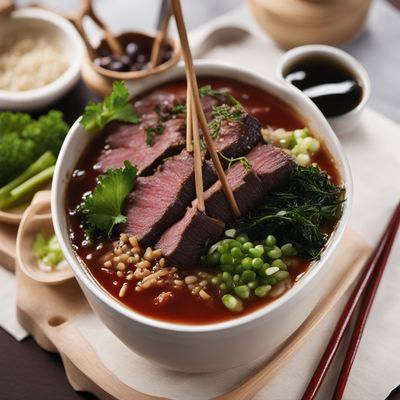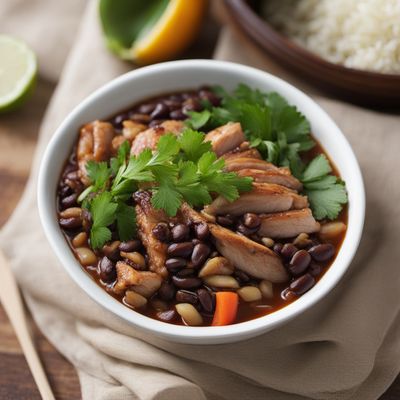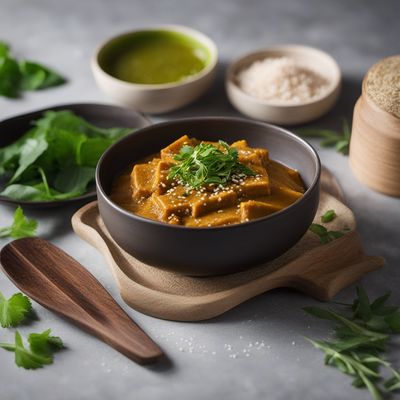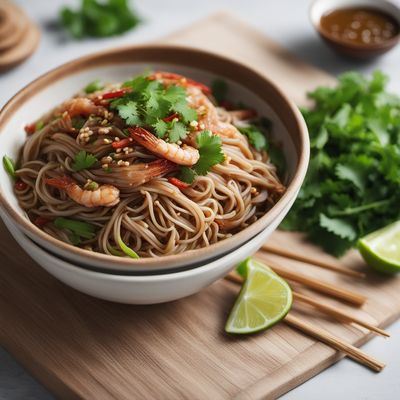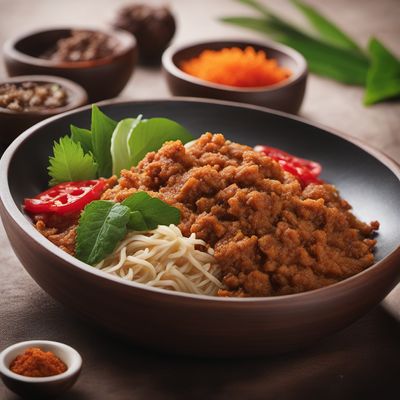
Recipe
Chinese Indonesian Style Goya Chanpuru
Savory Stir-Fried Bitter Melon with Tofu and Shrimp
4.2 out of 5
Indulge in the flavors of Chinese Indonesian cuisine with this delicious adaptation of the traditional Okinawan dish, Goya Chanpuru. This recipe combines the unique bitterness of bitter melon with the umami of tofu and shrimp, creating a harmonious blend of flavors.
Metadata
Preparation time
15 minutes
Cooking time
15 minutes
Total time
30 minutes
Yields
4 servings
Preparation difficulty
Easy
Suitable for
Pescatarian, Dairy-free, Gluten-free, Low carb, High protein
Allergens
Shellfish (shrimp), Soy (soy sauce)
Not suitable for
Vegan, Vegetarian, Nut-free, Egg-free, Soy-free
Ingredients
In this Chinese Indonesian adaptation of Goya Chanpuru, we incorporate Chinese Indonesian flavors and ingredients to create a unique twist on the traditional Okinawan dish. The addition of shrimp and the use of Chinese Indonesian spices such as garlic, ginger, and chili give this dish a distinct flavor profile. The cooking technique remains similar, focusing on stir-frying the ingredients to retain their textures and flavors. We alse have the original recipe for Goya chanpuru, so you can check it out.
-
2 bitter melons (goya), sliced and deseeded 2 bitter melons (goya), sliced and deseeded
-
200g (7 oz) tofu, cubed 200g (7 oz) tofu, cubed
-
200g (7 oz) shrimp, peeled and deveined 200g (7 oz) shrimp, peeled and deveined
-
2 cloves garlic, minced 2 cloves garlic, minced
-
1 thumb-sized ginger, grated 1 thumb-sized ginger, grated
-
2 red chilies, sliced 2 red chilies, sliced
-
2 tablespoons soy sauce 2 tablespoons soy sauce
-
1 tablespoon oyster sauce 1 tablespoon oyster sauce
-
1 tablespoon vegetable oil 1 tablespoon vegetable oil
-
Salt and pepper to taste Salt and pepper to taste
Nutrition
- Calories (kcal / KJ): 250 kcal / 1046 KJ
- Fat (total, saturated): 12g, 2g
- Carbohydrates (total, sugars): 12g, 4g
- Protein: 24g
- Fiber: 4g
- Salt: 2g
Preparation
-
1.Heat the vegetable oil in a wok or large skillet over medium heat.
-
2.Add the minced garlic, grated ginger, and sliced chilies. Stir-fry for 1-2 minutes until fragrant.
-
3.Add the shrimp and cook until they turn pink and are cooked through, approximately 3-4 minutes.
-
4.Add the bitter melon slices and continue stir-frying for another 3-4 minutes until they start to soften.
-
5.Add the tofu cubes, soy sauce, and oyster sauce. Stir-fry for an additional 2-3 minutes until the tofu is heated through.
-
6.Season with salt and pepper to taste.
-
7.Remove from heat and transfer to a serving dish.
-
8.Serve hot with steamed rice.
Treat your ingredients with care...
- Bitter Melon — To reduce the bitterness of the goya, you can soak the sliced bitter melon in salted water for 10-15 minutes before cooking. Rinse well before using.
- Tofu — Use firm tofu for this recipe to ensure it holds its shape during stir-frying.
Tips & Tricks
- Adjust the amount of chili according to your spice preference.
- For a vegetarian version, omit the shrimp and add more tofu or substitute with mushrooms.
- Serve with a squeeze of lime juice for an extra tangy flavor.
- Feel free to add other vegetables such as bell peppers or snap peas for added texture and color.
- Leftovers can be stored in an airtight container in the refrigerator for up to 2 days.
Serving advice
Chinese Indonesian Style Goya Chanpuru is best served hot with steamed rice. Garnish with fresh cilantro or green onions for added freshness and color.
Presentation advice
Arrange the stir-fried bitter melon, tofu, and shrimp on a serving plate, ensuring a colorful and visually appealing presentation. Serve alongside a bowl of steamed rice for a complete meal.
More recipes...
For Goya chanpuru
For Okinawan cuisine » Browse all
More Okinawan cuisine dishes » Browse all
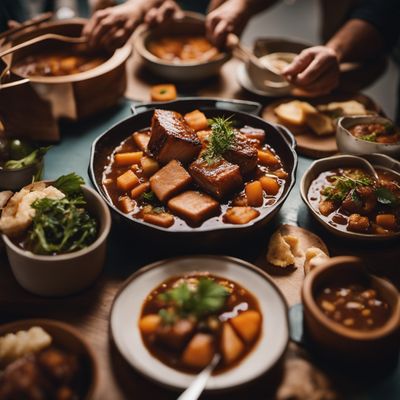
Rafute
Pork Belly Stew
Rafute is a traditional Okinawan dish that is made with pork belly and soy sauce. It is a rich and flavorful dish that is perfect for cold winter nights.
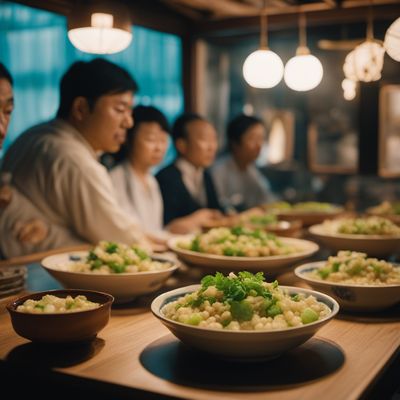
Goya chanpuru
Goya chanpuru is a popular Okinawan dish made with bitter melon, tofu, and pork belly.

Shutō
Pickled Fish Guts
Shutō is a traditional Japanese dish made with fermented fish and soy sauce.
